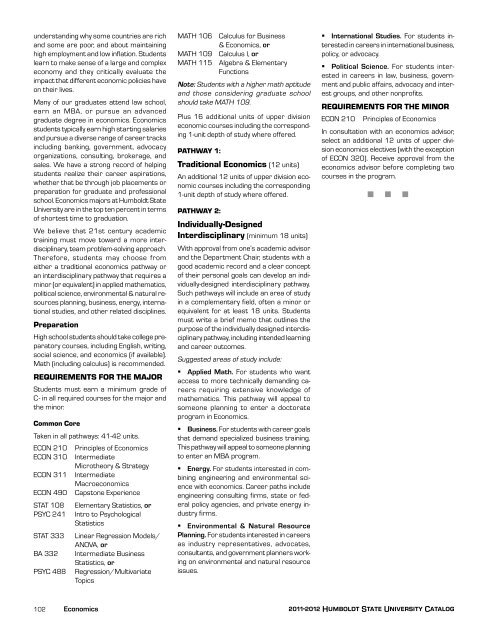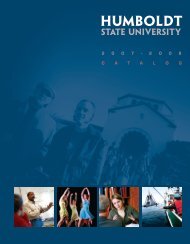2011-12 Academic Year - Bad Request - Humboldt State University
2011-12 Academic Year - Bad Request - Humboldt State University
2011-12 Academic Year - Bad Request - Humboldt State University
Create successful ePaper yourself
Turn your PDF publications into a flip-book with our unique Google optimized e-Paper software.
understanding why some countries are rich<br />
and some are poor, and about maintaining<br />
high employment and low inflation. Students<br />
learn to make sense of a large and complex<br />
economy and they critically evaluate the<br />
impact that different economic policies have<br />
on their lives.<br />
Many of our graduates attend law school,<br />
earn an MBA, or pursue an advanced<br />
graduate degree in economics. Economics<br />
students typically earn high starting salaries<br />
and pursue a diverse range of career tracks<br />
including banking, government, advocacy<br />
organizations, consulting, brokerage, and<br />
sales. We have a strong record of helping<br />
students realize their career aspirations,<br />
whether that be through job placements or<br />
preparation for graduate and professional<br />
school. Economics majors at <strong>Humboldt</strong> <strong>State</strong><br />
<strong>University</strong> are in the top ten percent in terms<br />
of shortest time to graduation.<br />
We believe that 21st century academic<br />
training must move toward a more interdisciplinary,<br />
team problem-solving approach.<br />
Therefore, students may choose from<br />
either a traditional economics pathway or<br />
an interdisciplinary pathway that requires a<br />
minor (or equivalent) in applied mathematics,<br />
political science, environmental & natural resources<br />
planning, business, energy, international<br />
studies, and other related disciplines.<br />
Preparation<br />
High school students should take college preparatory<br />
courses, including English, writing,<br />
social science, and economics (if available).<br />
Math (including calculus) is recommended.<br />
REQUIREMENTS FOR THE MAJOR<br />
Students must earn a minimum grade of<br />
C- in all required courses for the major and<br />
the minor.<br />
Common Core<br />
Taken in all pathways: 41-42 units.<br />
ECON 210 Principles of Economics<br />
ECON 310 Intermediate<br />
Microtheory & Strategy<br />
ECON 311 Intermediate<br />
Macroeconomics<br />
ECON 490 Capstone Experience<br />
STAT 108 Elementary Statistics, or<br />
PSYC 241 Intro to Psychological<br />
Statistics<br />
STAT 333 Linear Regression Models/<br />
ANOVA, or<br />
BA 332 Intermediate Business<br />
Statistics, or<br />
PSYC 488 Regression/Multivariate<br />
Topics<br />
MATH 106 Calculus for Business<br />
& Economics, or<br />
MATH 109 Calculus I, or<br />
MATH 115 Algebra & Elementary<br />
Functions<br />
Note: Students with a higher math aptitude<br />
and those considering graduate school<br />
should take MATH 109.<br />
Plus 16 additional units of upper division<br />
economic courses including the corresponding<br />
1-unit depth of study where offered.<br />
PATHWAY 1:<br />
Traditional Economics (<strong>12</strong> units)<br />
An additional <strong>12</strong> units of upper division economic<br />
courses including the corresponding<br />
1-unit depth of study where offered.<br />
PATHWAY 2:<br />
Individually-Designed<br />
Interdisciplinary (minimum 18 units)<br />
With approval from one’s academic advisor<br />
and the Department Chair, students with a<br />
good academic record and a clear concept<br />
of their personal goals can develop an individually-designed<br />
interdisciplinary pathway.<br />
Such pathways will include an area of study<br />
in a complementary field, often a minor or<br />
equivalent for at least 18 units. Students<br />
must write a brief memo that outlines the<br />
purpose of the individually designed interdisciplinary<br />
pathway, including intended learning<br />
and career outcomes.<br />
Suggested areas of study include:<br />
Applied Math. For students who want<br />
access to more technically demanding careers<br />
requiring extensive knowledge of<br />
mathematics. This pathway will appeal to<br />
someone planning to enter a doctorate<br />
program in Economics.<br />
Business. For students with career goals<br />
that demand specialized business training.<br />
This pathway will appeal to someone planning<br />
to enter an MBA program.<br />
Energy. For students interested in combining<br />
engineering and environmental science<br />
with economics. Career paths include<br />
engineering consulting firms, state or federal<br />
policy agencies, and private energy industry<br />
firms.<br />
Environmental & Natural Resource<br />
Planning. For students interested in careers<br />
as industry representatives, advocates,<br />
consultants, and government planners working<br />
on environmental and natural resource<br />
issues.<br />
International Studies. For students interested<br />
in careers in international business,<br />
policy, or advocacy.<br />
Political Science. For students interested<br />
in careers in law, business, government<br />
and public affairs, advocacy and interest<br />
groups, and other nonprofits.<br />
REQUIREMENTS FOR THE MINOR<br />
ECON 210 Principles of Economics<br />
In consultation with an economics advisor,<br />
select an additional <strong>12</strong> units of upper division<br />
economics electives (with the exception<br />
of ECON 320). Receive approval from the<br />
economics advisor before completing two<br />
courses in the program.<br />
n n n<br />
102 Economics<br />
<strong>2011</strong>-20<strong>12</strong> <strong>Humboldt</strong> <strong>State</strong> <strong>University</strong> Catalog

















